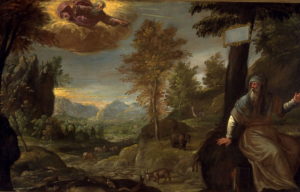Thoughts on Sunday’s Lessons for June 30, 2019
First Reading (Track One): 2 Kings 2:1-2,6-14
Here’s a Bible trivia question for you: Other than Jesus, who got into heaven still wearing an earthly body?

The Lord Commands the Prophet Elijah (1585-1589), oil painting on canvas by Paolo Fiammingo (c.1540-1596). Fine Arts Museums of San Francisco. (Click image to enlarge.)
Sunday’s Track One first reading tells us the story of the prophet Elijah taken up in a chariot of fire. The Apocrypha tell us that the prophet Enoch was “taken up,” too. In the Transfiguration we see Moses joining Elijah in a shining body to greet Jesus; and modern Catholic doctrine holds that Mary, the mother of Jesus, was “assumed” bodily into heaven. As you think about this passage, consider the challenge that faces Elisha as he takes over the prophet’s job that Elijah handed over as he moved on.
First Reading (Track Two): 1 Kings 19:15-16,19-21
The two books of Kings sum up the story of Israel’s kings from the reign of David until the fall and exile of the kingdoms of Israel and Judah. Sunday’s Track Two first reading enters the narrative as the prophet Elijah, who had been chosen by God to speak truth to Israel’s kings and to warn them that disaster lay ahead, was despairing because he feared death at the hands of his foes. But God gives Elijah strength and sens him on with instructions to choose Elisha as his successor. Elisha hesitates, foreshadowing the reluctant followers of Jesus in today’s Gospel as he goes back first to kiss his parents and feed his family – but then he comes along.
Psalm: (Track One): Psalm 77:1-2, 11-20
This Psalm’s stormy images of dark clouds, thunder, lightning and pounding rain stand as metaphors for a God whose mighty deeds reveal power and might. Deeply troubled and crying out without ceasing, the Psalmist calls on God without tiring, seeking comfort for the soul yet refusing to accept it when it comes. But then hope appears as we reflect on God’s power in the storm and remember how God gently led the people out of slavery and protected them in the desert.
Psalm: (Track Two): Psalm 16
Almost exactly half of the 150 Psalms are attributed by tradition to the hand of King David, as is this one, titled “Song of Trust and Security in God” in the New Revised Standard Edition. The speaker, David or a later Psalmist writing in his name, calls out for God’s protection and guidance. Those who follow false gods will only increase their trouble, the poet sings. But by accepting God as his “portion and cup,” his heart will be glad and his spirit will rejoice, knowing that God will not abandon him to the grave.
Second Reading: Galatians 5:1,13-25
We return to Paul’s letter to the Galatians two chapters after last Sunday’s second reading. He continues his argument that the way of Christ is open to all humankind: God’s covenant with Israel extends through Christ to Jew and Gentile alike. The law of that covenant, he goes on, requires us to love our neighbors as ourselves, not to “bite and devour” one another. The Spirit binds us to our neighbors in “love, joy, peace, patience, kindness, generosity, faithfulness, gentleness, and self-control.”
Gospel: Luke 9:51-62
Jesus now sets his face to go to Jerusalem. From now through the end of the long Pentecost season at the end of November, we will follow Luke’s account of Jesus’ long journey from his home in Galilee toward Jerusalem, his Passion and the Cross. As the journey begins in Sunday’s Gospel, we see a side of Jesus that may surprise us with his seeming frustration and impatience. Is his call to come and follow him so urgent that disciples must leave their dead un-buried? Is there really no time even to bid their families farewell, as Elisha did when Elijah called him? For Jesus, everything now focuses on urgency in bringing in the Kingdom. Nothing else is more important than that.
